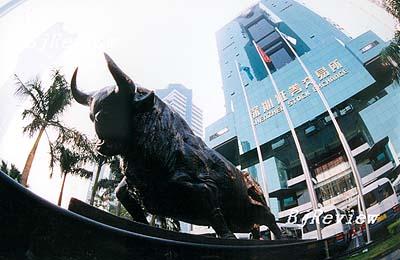|

By the end of 2005, the total market value of the yuan-denominated A-share market was only 3 trillion yuan ($400 billion). Some joked that this was even less than the value of Microsoft. That joke didn't last, however. By the end of October this year, the value of the Chinese stock market ballooned to 28.5 trillion yuan ($3.8 trillion), the fourth highest valued bourse in the world.
In just two years, the country's stock market has become one of the greatest ever success stories in the world's capital markets. But many are still wondering: Can the stock market really turn China into a capital giant?
Prosperity fixation
The value of the Chinese stock market has swelled nine times in just two years and has become the fastest growing market in the world. Its stock exchanges in Shanghai and Shenzhen compose two important platforms for the development of the Chinese capital market.
When the Shanghai Stock Exchange was founded in 1990, the A-share market value was merely 3.1 billion yuan ($413 million). It could not compare with the emerging markets of South Korea and India, let alone stock exchanges of Hong Kong and New York.
However, on October 9, 2007, the total value of the Shanghai Stock Exchange reached 21.38 trillion yuan ($2.85 trillion), surpassing that of Hong Kong and edging in to rank as the sixth largest stock exchange in the world.
Hu Ruyin, Director of Research Center of the Shanghai Stock Exchange, stated that the rapid market value increase was largely caused by the split share structure reform starting in 2005. The reform cleared away the biggest systemic obstacles to the development of the Chinese capital market and helped push the stock market to record highs. The benchmark Shanghai Composite Index currently lingers around a high-water mark of 6,000 points.
The soaring market value pushed the so-called "market capitalization to GDP" (a rough idea of whether a stock market is overvalued or undervalued) to 130 percent, close to the level of developed stock markets like those in the United States and Japan. Two years ago this ratio was only 16.8 percent, showing the Chinese stock market was undervalued at the time.
In the current stock climate, institutional investors play an important role. Statistics from the China Securities Regulatory Commission (CSRC) show that by the end of July 2007, the institutional investors-including mutual funds, securities companies, insurance companies and qualified foreign institutional investors-accounted for 46 percent of the total A-share market value.
Shang Fulin, Chairman of the CSRC, noted that in the long term the relatively rapid development of the macroeconomy, the appreciation of the yuan, and the reshuffling of state-owned assets will help boost capital market development. Shang believes the long-term healthy development of the nation's capital market is almost assured.
Acting its age
Rapid economic development has actually exposed problems in China's capital market development.
In his congratulatory letter to the 47th annual meeting of the World Federation of Exchanges, Shang said the main feature of the Chinese capital market was that it was "emerging and transforming." He said that with its limited development age, the capital market was not yet mature enough and that substantial reform needed to be done to optimize its structure.
Shang said the capital market had developed in the middle of the transformation from a planned economy to a market economy. Market infrastructure is not solid enough, the supervision over securities market needs to be tightened, and investors must be educated, he said. "Problems have accumulated in the capital market which grew during this special historical stage," Shang said.
| 